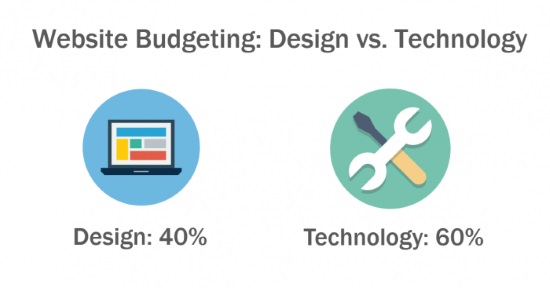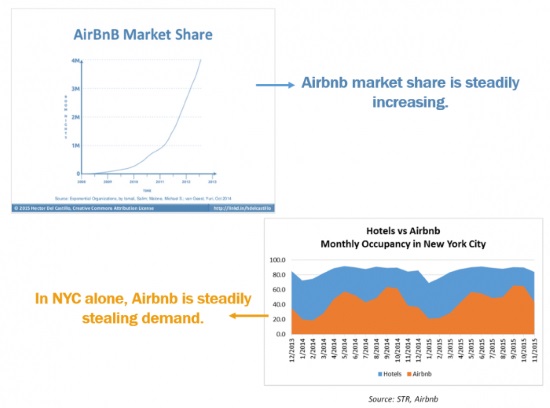
Starkov’s technology and marketing resolutions for hoteliers (part two)
By cameron in Uncategorized
Finding the balance between form and function on the hotel dotcom, personalisation of marketing campaigns and the threat of Airbnb are among the issues hoteliers need to address in 2017 in order to attract more direct bookings.
NB: This is a viewpoint by Max Starkov, president & CEO, and Mariana Safer, senior vice president of marketing, at HeBS Digital.
Last week we shared five resolutions hoteliers should consider if they want to get more guests to book direct and reduce their exposure to third-parties such as OTAs. Here are another five mantras hoteliers can adopt when thinking about distribution dilemmas.
6. “I understand there should be the right balance between beauty and science behind my property website, and that focusing on aesthetics alone will mean my competitors will steal my market share.”
- Situation
As the need to prioritise the direct booking channel is coupled with an increasingly complicated path-to-purchase behaviour of the multichannel and multidevice travel consumer, today’s hotel website cannot afford to be read as a static brochure, it must be powered by a state-of-the art content management system (CMS) technology platform.
The real long-term cost of choosing the wrong CMS for the hotel website is a dramatic loss of direct revenue, increased distribution costs and increased dependency on the OTAs. Without the right technology powering the hotel website, hoteliers not only fail to engage, retain and acquire past and future guests but also seriously jeopardize direct revenue in this time of flattening occupancy rates and increased distribution costs.
- Action plan
A successful hotel website must incorporate the right balance of excellent and responsive design, state-of-the-art CMS technology, robust merchandising capabilities and engaging visual and textual content, while providing an optimum user experience from top to bottom.
When budgeting for a new hotel website, no more than 40% of the new website costs should go to the design of the website, with the remaining 60% plus going towards the technology behind it.

The CMS powering your hotel website should give you the ability to control all of the textual and visual content on the website, dynamically personalise promotions and content based on who the user is (demographics, feeder market origin, past booking history, loyalty member affiliation, etc.), recover abandoned reservations, and easily integrate with other systems you use.
It should be easy to use yet flexible enough to support all types of hospitality businesses – from independent hotels to multi-brand hotel companies.
Click here to read “The Complete Guide to Choosing the Right Website CMS Technology”
7. ” I will not treat every website visitor the same and will take dynamic content personalisation to the next level in 2017.”
- Situation
It’s known that smarter, personalised content produces better results and higher direct website bookings. By personalising, in an automated fashion, website promotions, visuals and marketing content based on users’ location, demographics and purchase intent, hoteliers can increase revenues by 40% and more.
Unfortunately, many hotel websites serve the same promotional, visual and textual content to all visitors, irrespective of whether these are first-time visitors or past guests that have stayed at the property many times. This year, it’s time to make personalisation a top priority and take it to the next level.
- Action plan
At the minimum, in 2017 your website should be dynamically personalising content by a user’s location and feeder market origin, demographics, preferred language in browser, and purchase intent.
Even better, your website should be automatically personalizing promotional, visual and textual content based on the user’s past booking history, loyalty program affiliation, type of accommodations booked in the past, guest preferences from the guest profile in the PMS, user and pathing behaviour on the website, and more.
This is the type of experience travel consumers are expecting from any website in 2017!
The technology you use to dynamically personalise content should not be separate from the technology you use to manage the content on your website day-to-day, otherwise you run the risk of not having enough time or resources to keep up with this critical initiative.
Invest in a CMS that has dynamic content personalisation integrated into its capabilities.
8. “I understand that CRM is a must-have component of overall past and future guest engagement, retention and acquisition.”
- Situation
Knowing your guests is critical. Building brand loyalty is becoming increasingly difficult in a time of so many choices, but hoteliers can earn it through superior guest services and the quality of their product.
CRM data – which covers past guest profile information, past booking history, service preferences, purchasing habits while on property, affiliation with the hotel guest loyalty program, booking channel preferences, preferences for auxiliary services, opt-in email recipients – provides great insight into who your most loyal guests are, what they love about your hotel brand, and when utilized well, generates direct website bookings.
- Action plan
Using automated email or text marketing for guest engagement and retention – such as pre-arrival, post-arrival, and a “one-year anniversary of your trip” emails – is just the beginning.
The real CRM starts when past guest data is used to identify and target future best guests via building customer personas and lookalike audiences. CRM also drives smart data marketing, dynamic personalising of content on the property website and, ultimately, a better and more individualised customer service pre-, during and post-stay.
The real CRM also starts with utilizing guest data to create a guest appreciation program (or loyalty program) which every single independent hotel, small chain or brand should have.
You can make your CRM strategy more robust by segmenting guests by loyalty status and preferences based on past purchases, on-property behavior, website browsing or intent behavior, and other online signals.
Make the user experience even more individualised by personalising promotions, packages and specials offers based on loyalty membership status, past booking history and expressed interest in the property’s food and beverage, spa or golf services and amenities.
Use your CRM data to further sharpen the targeting capabilities of your digital marketing campaigns (display, search, social media, email and content marketing) and invest time in nurturing past guest relationships and increasing their lifetime value.
Show both past and future guests that you understand who they are, by delivering more personalized marketing messages across your campaigns.
9. “I will not underestimate the impact of players like Airbnb, and will focus on presenting features and amenities that Airbnb properties lack.”
- Situation
In these times of flat and even negative occupancy projections, and with Airbnb satisfying a portion of the travel demand, hoteliers must fight for every guest inclined to stay at an Airbnb rental.
Airbnb is taking 10-12% of travel demand in New York City, Paris, London and other major global metropolitan areas alone.
The impacts overall occupancy and hotel room pricing, preventing hotels from raising average daily rates (ADRs) in periods of traditional peak demand.
Airbnb’s valuation of over $10 billion now exceeds that of some global hotel chains. According to HVS, it is estimated that the hotel industry loses approximately $450 million in direct revenues to Airbnb per year. Hotels must take action in order to combat the negative effect Airbnb has on the industry.

- Action plan
To combat the effects of Airbnb, hoteliers should promote features and amenities on its property website and through digital marketing campaigns that Airbnb lacks, such as 24/7 security, accessibility, baggage storage, room service, concierge, luxuries such as plush robes, and employees dedicated to customer service.
This also includes amenities such as spa services, onsite dining, fitness center, inspiring communal spaces for guests to gather and socialize, including well-designed lobbies, bars and cafes, executive meeting rooms and so on.
Guest appreciation or loyalty programs, supported by a robust CRM program (see resolution #8 above), which every independent hotel, small chain or brand should have, is another major advantage to hoteliers over Airbnb.
Read “HeBS Digital’s Guide on How to Combat Airbnb.”
10. “I will choose a digital technology and marketing partner that understands the industry, my property, and how to drive direct website bookings.”
- Situation
The more complex the consumer’s path to purchase becomes, and the more touchpoints they go through before making a booking, the more important it is to establish a cohesive marketing strategy.
In order for a hotelier to successfully drive direct website bookings and lower distribution costs they need one source of truth for their digital technology and marketing strategy.
With too many vendors in the mix, hoteliers run the risk of trying to do too much with too little. They stretch their budgets and their time too thin. Add to this the onslaught of so-called hotel digital marketing experts, and its little wonder why many hoteliers succumb to the lure of the OTAs.
- Action plan
Partner with website revenue optimization consultants that are a dedicated and virtual member of your property’s team, focused on the singular task of improving your hotel company’s direct website bookings and increasing occupancy.
Make sure they do this by utilizing the full spectrum of digital marketing technology and marketing tools available to hotels today.
This consultant should be a highly skilled digital marketing consultant trained in the hospitality industry, representing a unique skill set dedicated to helping hoteliers manage the direct online channel.
See also:
Starkov’s technology and marketing resolutions for hoteliers (part one)
NB: This is a viewpoint by Max Starkov, president & CEO, and Mariana Safer, senior vice president of marketing, at HeBS Digital. The article originally appeared on the HeBS Digital blog and is republished here with permission.
NB2: Image by Kentoh/BigStock.com.
![]()

